Youth and Climate : Shaping The Future
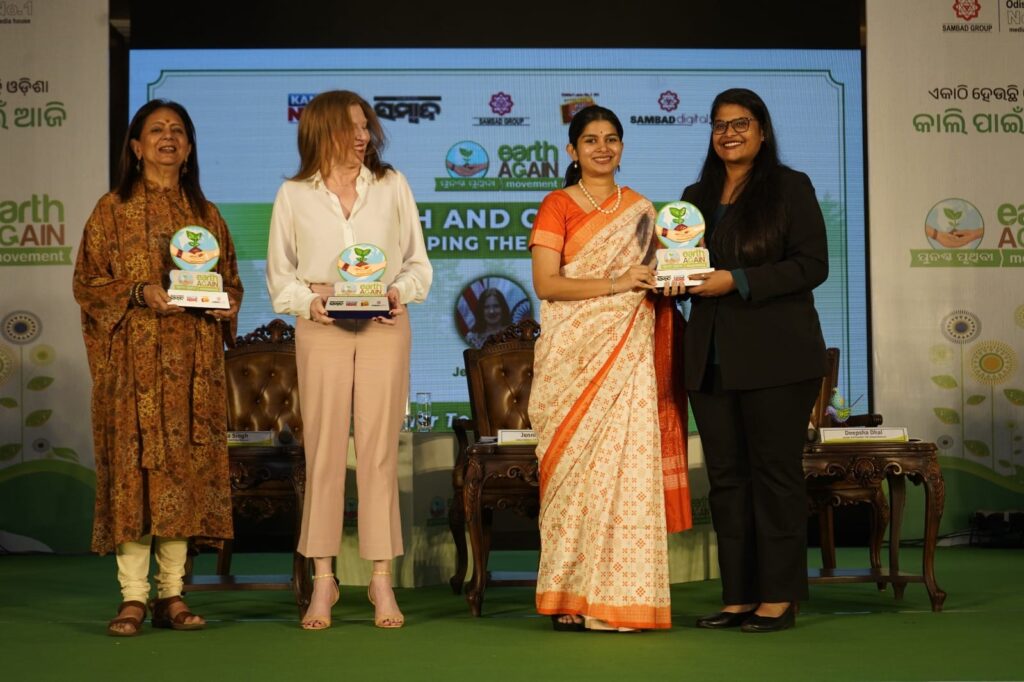
At the “Youth and Climate – Shaping the Future” session of The Earth Again Conference, Ms Deepsha Dhal began by warmly greeting the audience as “Climate champions,” expressing gratitude and addressing the importance of the previous session. She emphasized that one doesn’t need to be an environmentalist to contribute to climate efforts. Ms Jennifer Larson expressed her delight in being part of the conference and praised the Earth Again initiative, highlighting the youth’s role as leaders in this movement. Mrs Karuna Singh discussed the initiatives of the Earth Day Network, stressing the significance of networking and collaboration, noting that no one can tackle climate challenges alone. She emphasized the youth’s energy, idealism, and creativity as crucial assets for climate activism and encouraged them to pursue this cause selfishly for their own benefit. The session concluded with the powerful notion that the world is safe in the hands of the youth.
Eco Tourism: Reducing Carbon Footprint and Implementing Best Practices
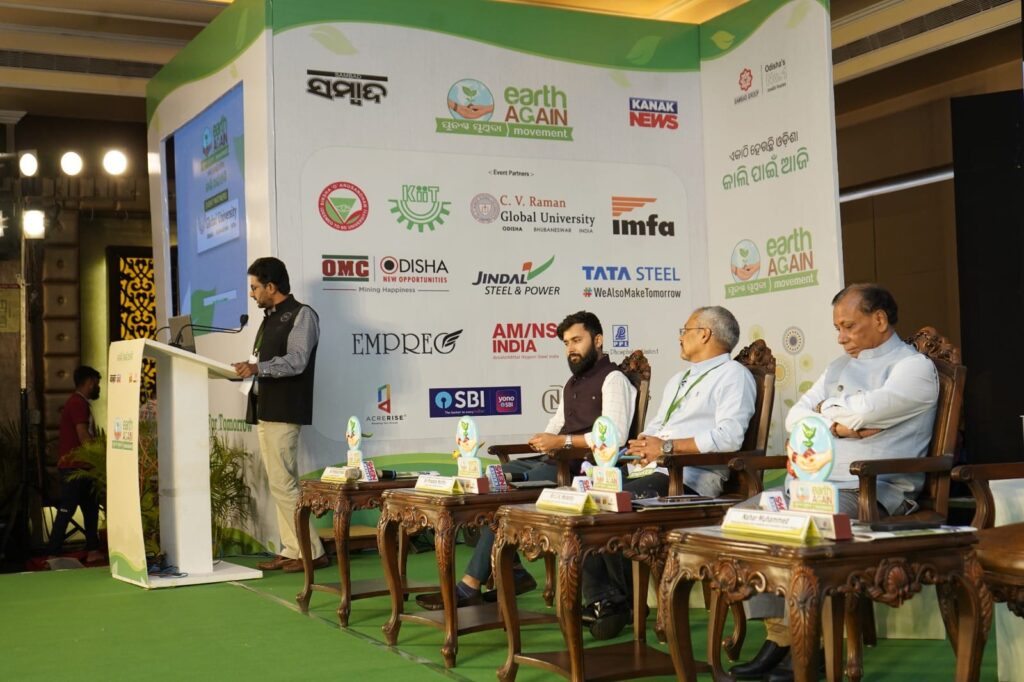
At the “Eco Tourism – Reducing Carbon Footprint & Implementing Best Practices” session, Mr Nahar Muhammed discussed the evolution of ecotourism, focusing on conservation and Odisha’s role in setting an example. Mr JK Mohanty shared his experience with Swosti Chilika, emphasizing environmental preservation, supporting local communities, and reducing carbon footprints through sustainable travel and circular supply chains. Mr Pradeep Murthy highlighted growing demand for nature-based, community-centered tourism, noting that 65% of travelers prefer sustainable, authentic experiences that benefit both people and the environment. Mr Pravat Kumar Panda explained how technology supports ecotourism by improving tracking, connectivity, and marketing. Mr Nahar Muhammed concluded by summarizing these insights.
Climate Panchayat and Climate Atlas: A Roadmap for Action
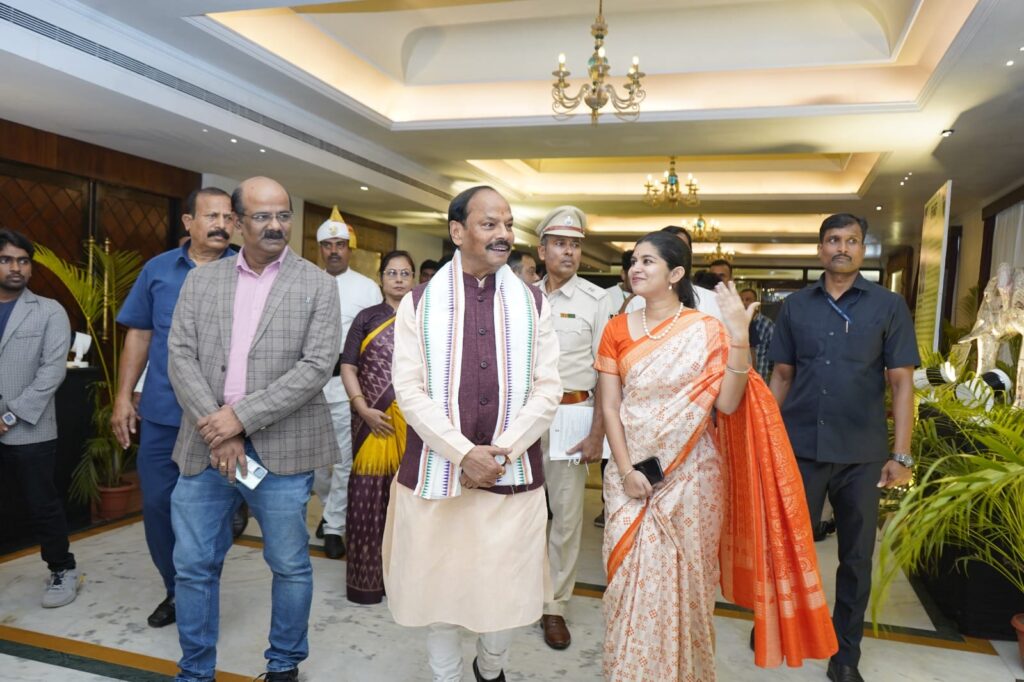
At the “Climate Panchayat and Climate Atlas: A Roadmap for Action” session of The Earth Again Conference, Hon’ble Governor Raghuraj Das Welcoming the “Punascitha Prithivi” initiative, the Governor highlighted its potential to combat climate change. He stressed the need to reduce air pollution, curb rising temperatures, and adopt a sustainable lifestyle. He also pledged his support for the Prime Minister’s vision of “One Earth, One Family” and vowed to protect the environment for future generations. Deputy Chief Minister Kanak Vardhan Singh Deo said The Sambad Group’s “Punascitha Prithivi” initiative will be implemented across all districts through the district collectors. He appealed to the public to participate in the movement by planting trees in each other’s names, emphasizing that collective effort is key to making this environmental endeavor a success. Hon’ble Minister, Revenue and Disaster Management, Odisha, Suresh Pujari stressed that climate protection must not be compromised for development, which causes pollution and resource depletion. He assured Sambad they are not alone, as the government is also committed to the cause, and called for interdepartmental cooperation.
Climate Emergency: The Need for Strong Political Will
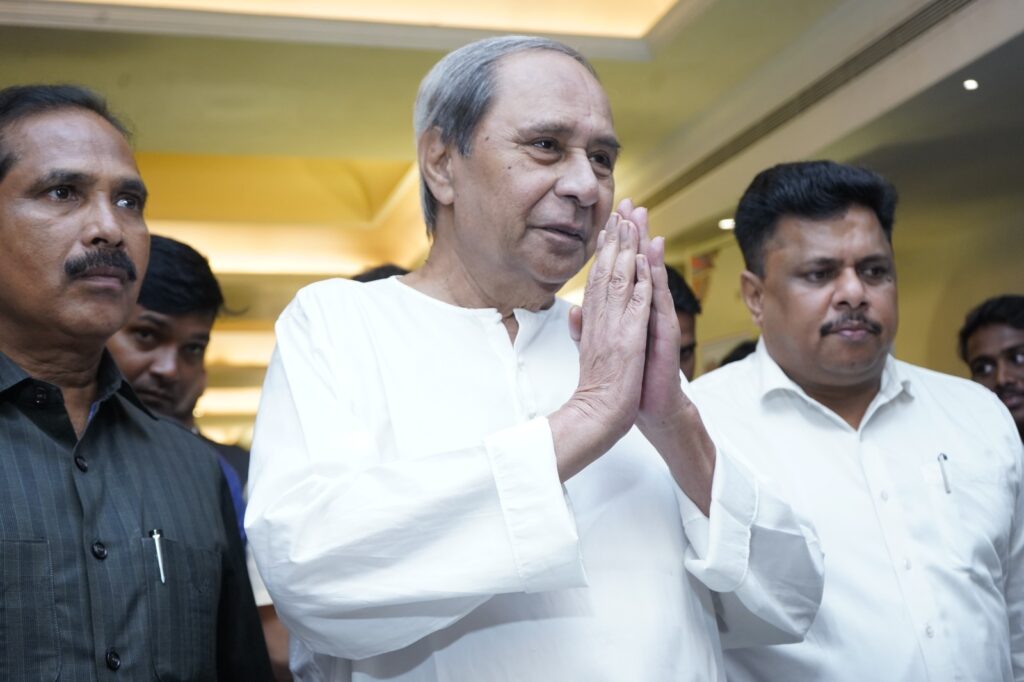
At the “Climate Emergency: The Need for Strong Political Will” session of The Earth Again Conference, Mrs. Tanaya Pattnaik highlighted the numerous initiatives taken by the Sambad Group through its various platforms as part of the Earth Again movement. Shri Naveen Patnaik addressed the audience, recalling that the biggest challenge in his political career was tackling disaster-prone Odisha. He emphasized his role in raising climate awareness and positioning Odisha as a leader in disaster management. He expressed gratitude for Sambad’s efforts and stressed the urgency of action, stating, “Time is running out; we can no longer wait and watch.”
Green Mining and Just Transition
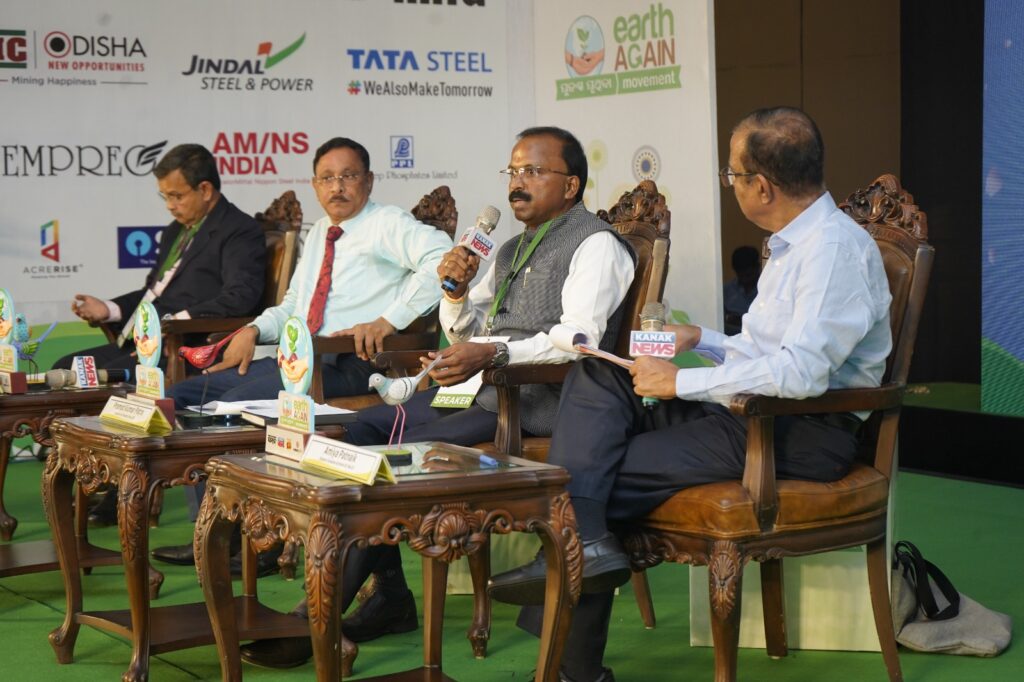
At the “Green Mining and Just Transition” session of The Earth Again Conference, Mr. Amiya Patnaik as the discussant Mr. Deepak Mohanty, Retd IFS and Ex Director Mining explained that green mining is a more regulated form of traditional mining, aimed at minimizing ecological impact and compensating for biodiversity loss. Mr. Pramod Kumar Patra,Executive Vice-President,Mines, JSPL emphasized that mining originates from forests, and while cause and effect are inevitable, research and development (R&D) and leadership play key roles in shaping its future. Mr. Prasanna Panda,President,JSW stressed the importance of inclusive growth in mining, calling for community involvement, a shift to renewable energy, and consideration of people and alternatives.
Tribal Practices and Forest Conservation
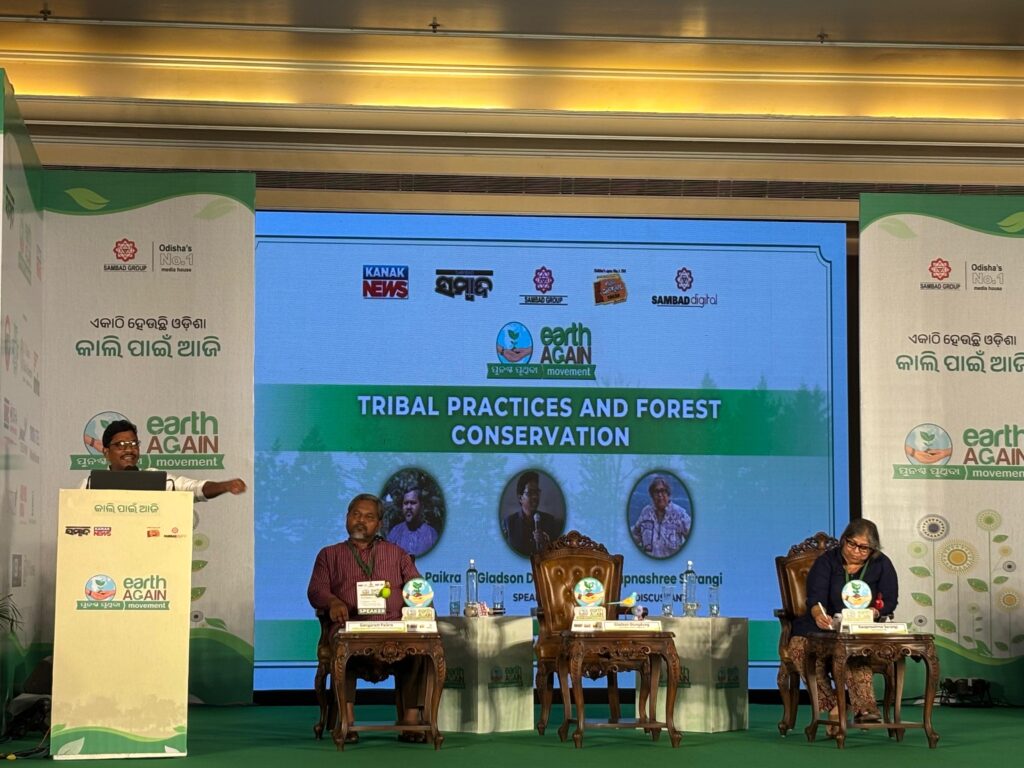
At the “Tribal Practices and Forest Conservation” session of The Earth Again Conference, speakers emphasized the deep connection between tribal communities and forests. Mrs. Swapnasree Sarangi,General Manager, FES highlighted the need to view tribal relationships with forests through a new lens, as forests form their economic, cultural, and political identity. Mr. Gladson Dungdung, Human Rights Activist and Researcher spoke on tribal coexistence with nature, contrasting their need-based practices with the greed-driven urbanization. He called for vigilance in protecting forests and emphasized tribal farming that promotes biodiversity. Mr. Gangaram Parika, President, Chaupal Gramin Vikas Prashikshan Evam Shodh Sansthan noted that Adivasis already practice forest conservation genuinely, not for show. The session concluded with a collective call for respecting existing knowledge systems, preventing unnecessary destruction, and moving from dialogue to action.
Sustainable Cities and Green Building Practices
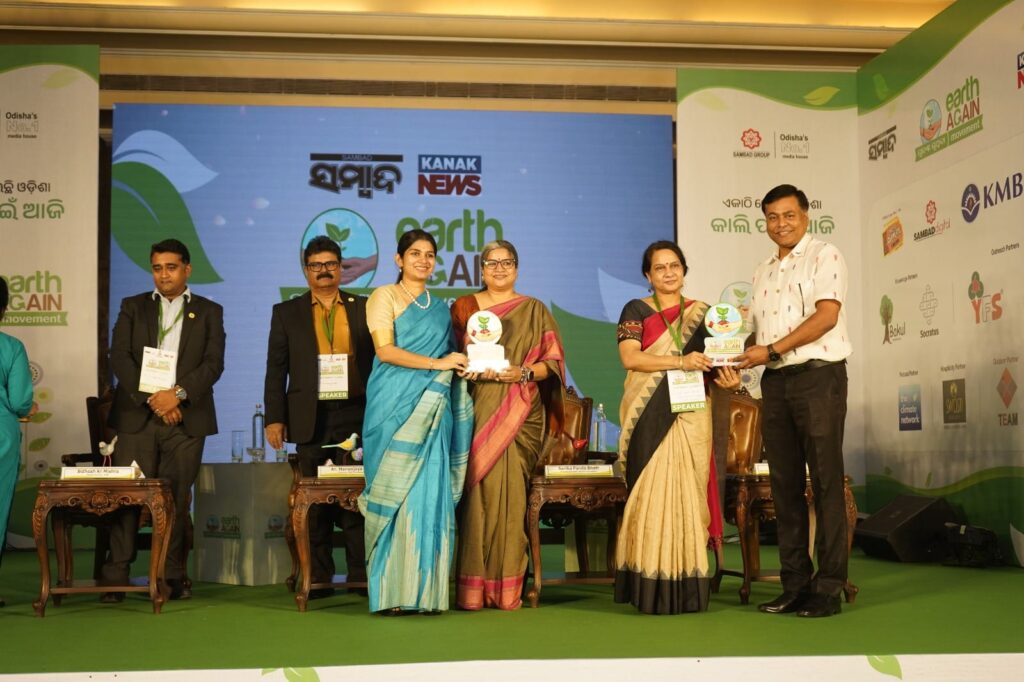
Ar Manonjaya Rath, Chairman of IGBC Bhubaneswar, stressed the critical need for Green Building in India, noting that much of the country’s infrastructure is yet to be developed. By emphasizing energy efficiency, integrating the 3Rs (recharge, reduce, reuse), and adopting rainwater harvesting, he highlighted how Green Building is key to a sustainable future. Sidhesh Ku. Mishra, Deputy Director of IGBC, spoke about the crucial role of the India Green Building Council (IGBC) in advancing sustainable construction practices and championing environmentally responsible, energy-efficient buildings across India. Sarika Panda Bhatt, Founder and Trustee of Raahgiri Foundation, emphasized that India must develop its own unique urbanization model, as it cannot directly follow the U.S. approach due to differing contexts and challenges. She called for a Net Positive strategy, focusing on creating accessible, sustainable, and resilient urban spaces. Kajri Mishra warned that India is facing a crisis and will be unable to meet the SDG goals without transforming its cities. She stressed that sustainable urbanization alone is insufficient and urged a shift towards Net Positive urbanization with a strong emphasis on city resilience to address these pressing challenges.
Environment Filmmaking: Inspiring Change through Stories
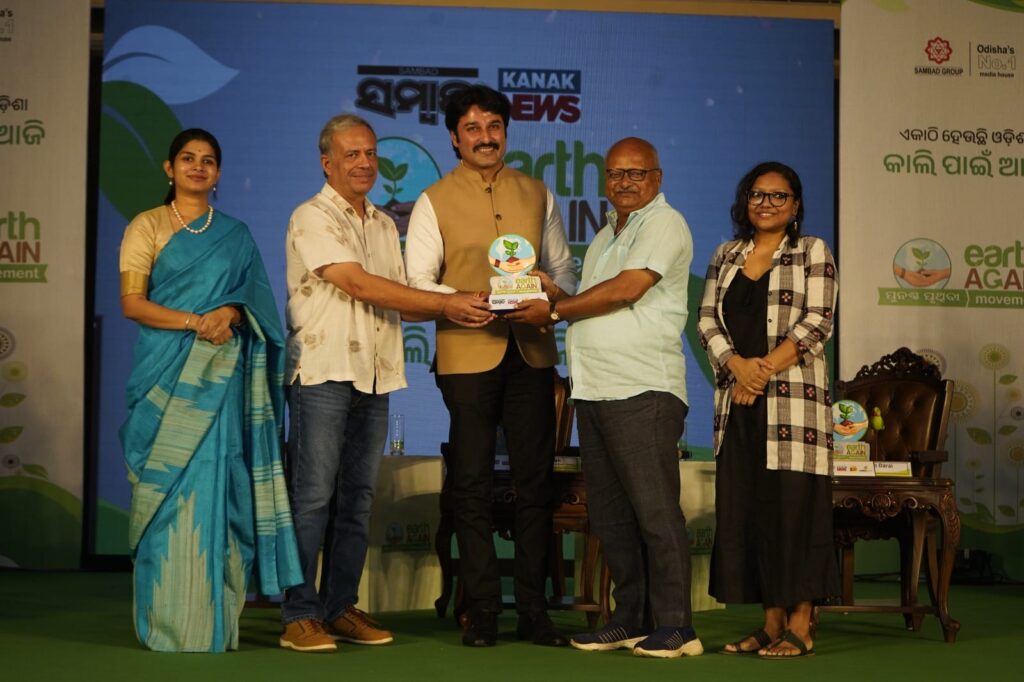
At the “Environment Filmmaking: Inspiring Change Through Stories” session of the Earth Again Conference: Mr. Sanjay Barnela, documentary filmmaker, emphasized the camera’s power in connecting environmental issues, highlighting the role of storytelling in spreading awareness and noting filmmaking’s unique ability to convey metaphorical messages beyond traditional media. Mr. Akash Das Nayak, MLA of Korei, actor, and social worker, stressed the urgency of environmental action, likening it to the need for air, and called for collective efforts while promising support for Odia film industry policies that promote such initiatives. Ms. Lipika Singh Darai, filmmaker, urged the audience to view Earth as an extended body deeply connected to us, and highlighted the untapped potential of Odisha’s film industry in environmental advocacy, calling for state initiatives to support this.
Sustainable Agriculture: Pathways to Resilience
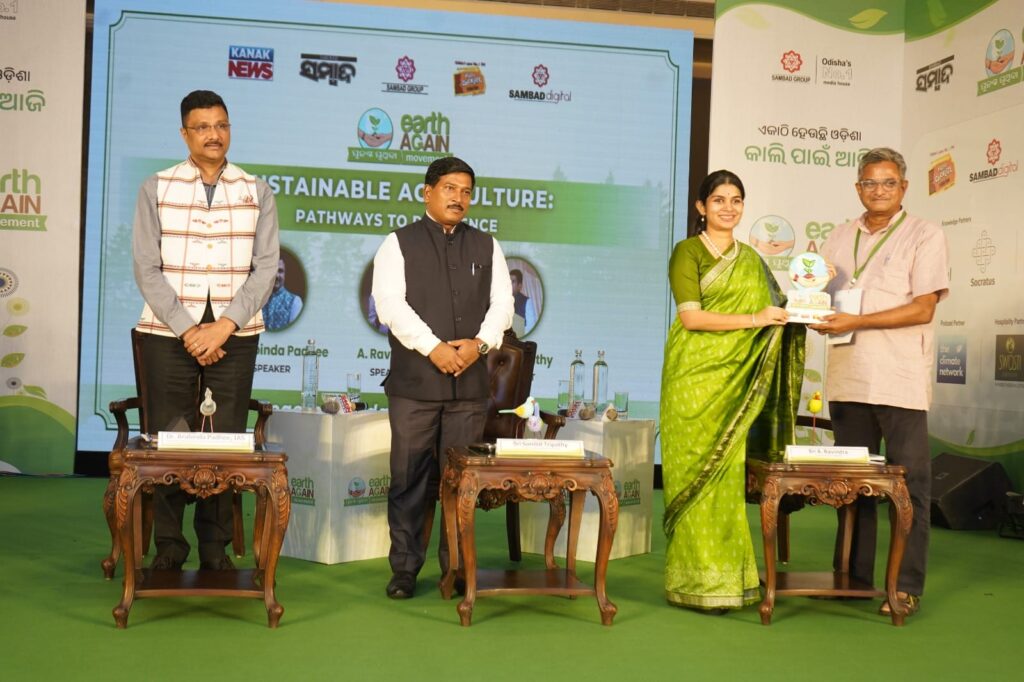
At the “Sustainable Agriculture – Pathways to Resilience” session, Mr. Sambit Tripathy stressed that current agricultural practices are unsustainable. Mr. Arabinda Padhee called for simpler living, citing that only 3 of the last 50 years were normal for Odisha. He highlighted efficient food systems, natural methods, and inclusive growth, along with regenerative farming and rainwater harvesting. Mr. A. Ravindra emphasized that the climate crisis is linked to nutrition and pollution. He advocated for localized diversification, decentralized food systems, and the Odisha Millet Mission, noting that in pursuing uniformity, diversity was lost. Audience questions were effectively addressed.
Green Alternatives for a Sustainable Future
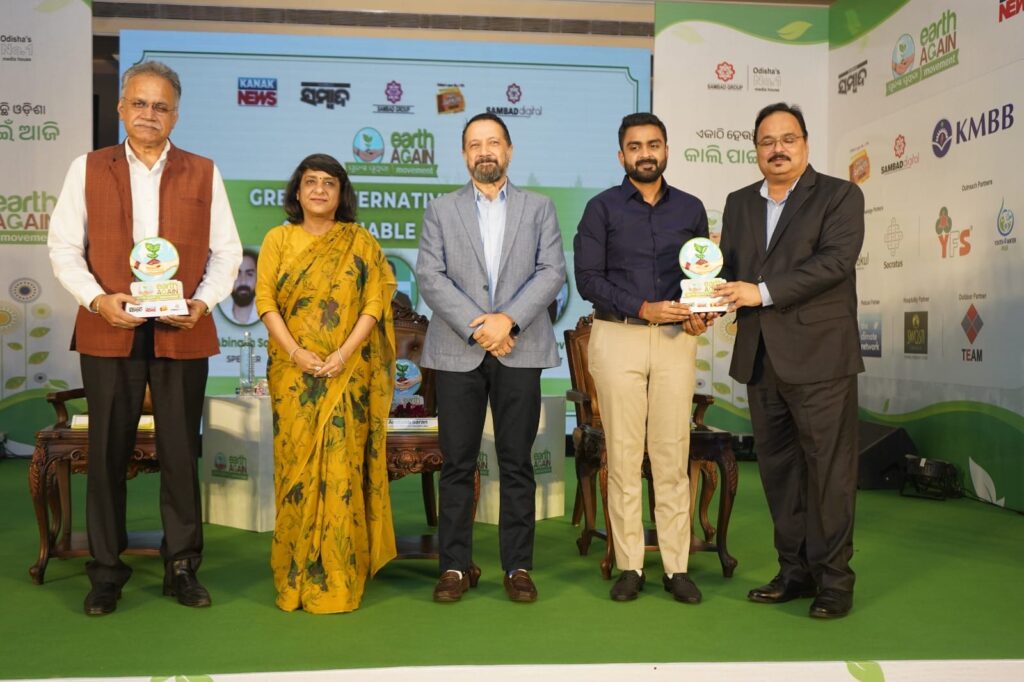
At the “Green Alternatives for a Sustainable Future” session, Mr. J.P. Jagdev urged people to rethink their lifestyles and recognize responsibility for the wider impact of their actions. Dr. Amitabh Saran emphasized that it’s humanity, not the planet, that needs saving, highlighting electric vehicles (EVs) as a solution to reduce the 5-6 lakh annual deaths from air pollution. He stressed the need for localized EV solutions in India. Dr. Abinash Samal called for more R&D for sustainable growth, highlighting India’s reliance on imports despite having resources and a severe talent shortage in sustainability, recycling, and upcycling fields.

